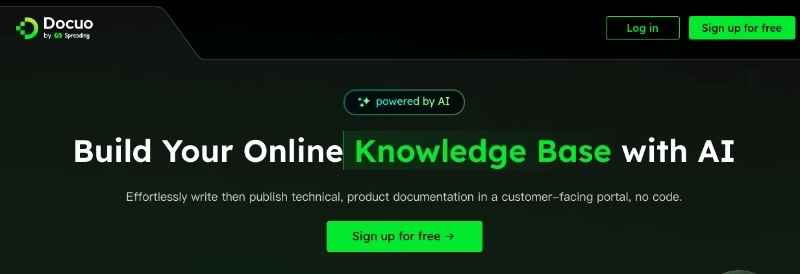Enterprises usually have extensive knowledge resources, and employees often struggle to navigate and extract appropriate information from this vast pool. In this situation, knowledge management can be challenging for organizing plenty of information.
Consequently, companies should expand their focus beyond data management to achieve effective governance and a data-driven culture and embrace a comprehensive strategy of enterprise knowledge management. In this article, we’ll find the best enterprise knowledge management software and the best practices to excel in the business.
What is Enterprise Knowledge Management?
Enterprise knowledge management refers to managing an organization’s knowledge base, people, and technology. It is used to collect and create different knowledge within a company that is well-organized and can be retrieved by the employees at any time. Besides, business owners can share this knowledge through various means with its integration with collaboration tools and social platforms.
Knowledge management in enterprises assists you in keeping your data up-to-date and ensures material availability per the company’s needs. Moreover, it aids in protecting sensitive or confidential information by controlling access and security measures. Organizations can easily access the knowledge utilization and knowledge gaps among employees using key performance indicators through EKM.
3 Key Parameters of Enterprise Knowledge Management
Organizations can ensure the passing of information by managing the knowledge system effectively. This effectiveness results in opening new ways to the power of collective wisdom. The key parameters of the enterprise knowledge management system to expand the company’s growth are given below.
Information Capture and Storage
There are different sources of knowledge in enterprises, and they can be in the form of documents, images, videos, databases, reports, and emails. Every data type requires a different method to capture and store the information. You can input data manually in digital systems, use automation tools, or utilize OCR technology. All in all, companies can store this information with security systems and retention policies by associating it with metadata.
Knowledge Sharing and Dissemination
The critical aspects of enterprise knowledge management are knowledge sharing and dissemination, which require systemic and strategic planning. Knowledge should be shared explicitly through formal or informal channels to enhance workflows. Companies should measure the usefulness of knowledge sharing through different metrics. Therefore, you can reach your target audience with careful consideration of content formats, timing, accessibility, and feedback mechanisms.
Knowledge Retrieval and Utilization
It is essential to retrieve and utilize knowledge efficiently because it greatly influences decision-making and problem-solving. For this purpose, you should manage knowledge so employees can search and navigate it. The data should include categories, taxonomies, keywords, and tags to make browsing seamless. Employees can make informed decisions with easy access using this knowledge base.
Benefits Of Enterprise Knowledge Management
The above discussion taught us the significance and key parameters of knowledge management in enterprises. Now, we will discuss a few benefits it provides in business sectors in the following list.
Minimize Data Loss
Enterprise knowledge management system minimizes the knowledge loss that is caused by employee turnover and changing conditions. You can document and facilitate the accessibility of knowledge and bridge the gap during resignations through these systems. For this purpose, they create a network by capturing and organizing data to make knowledge accessible to new employees.
Streamline Information Accessibility
Efficient knowledge management depends upon easy access to both explicit and tacit information. There is certain vital knowledge that remains undocumented because of uncertainty about who to consult for help. Therefore, this knowledge management provides a system that offers anonymity, encouraging employee engagement. The implementation of these systems provides easy access to all the information an employee or a customer needs.
Enhance Work Efficiency
Modern knowledge management assists companies in saving time, enabling self-resolution, and maintaining well-organized information. This up-to-date information allows teams to focus on critical business activities and enhances work efficiency. You can assign specific tasks to specific employees, such as your help desk assisting customers and other employees in onboarding and troubleshooting. Moreover, the same team can respond to urgent requests and tickets, leading to higher productivity.
Instant Responses to Queries
Businesses can benefit from these enterprise knowledge management systems in answering the queries of customers and employees in real-time. The average time of answering a question plays a crucial in winning or losing scale for an enterprise. Thus, knowledge management systems in enterprises share the knowledge with the team quickly to get their desired answers. Furthermore, these answers can be stored and recalled for future subject matters.
Break Down Data Isolation
Silos can impede collaboration by hoarding essential information within specific individuals or teams. Effective enterprise knowledge management breaks down these silos and fosters open communication. Moreover, it ensures that information is universally accessible, aligning with the company’s goals. Enterprise knowledge management bridges the gap between subject matter experts and employees who are in need of getting answers to a problem.
Top 5 Enterprise Knowledge Management Best Practices
We can enhance the production and growth rate of our enterprises only after careful implementation of knowledge management systems. Therefore, the following are the top 5 Enterprise Knowledge Management Best Practices.
Implement Effective Knowledge Capture Methods
Companies need to identify and harness knowledge sources for documentation and utilization of knowledge. They should utilize brainstorming sessions to address business issues and document solutions for internal use. Consequently, you should conduct pre-project meetings involving team members to share past experiences and clarify project details.
Promote Collaborative Teamwork
Business owners should promote collaborations to work cohesively and attain business objectives. It fosters a culture of sharing insights, experiences, and diverse perspectives that are essential for business growth. Therefore, modern knowledge management software enhances team collaboration by clarifying individual roles and promoting efficiency and clarity.
Organize Acquired Knowledge
Organizations should maintain their knowledge in a well-structured way for easy access to customers and employees. You should begin with a homepage including a list of knowledge base contents, offering an overview. Besides, to maintain a logical hierarchy, you can organize information into relevant categories and subcategories.
Establish Performance Enhancement Review Procedures
There should be an implementation of a systematic review process in post-documentation in enterprise knowledge management. The contributors and editors should ensure article accuracy and fix errors promptly. Subject matter experts can play a vital role in the quality enhancement of an article. After writing, you can streamline the review process for a flawless knowledge base.
Utilize Software for Enterprise Knowledge Management
The essential Practice in managing enterprise knowledge is the utilization of enterprise knowledge management software. They centralize business information for convenient access by employees on any device. At this stage, Docuo comes in as the best enterprise knowledge management software for rationalization of the process. This AI tool co-authors with you and transforms codes into winning documents for effective knowledge base management.
Moreover, you can generate a directory and a centralized document for all products for your enterprise with this software. Companies can embrace well-designed themes and templates for their brand identity on this platform.
Using Docuo for Enterprise Knowledge Management
Docuo is an AI-powered all-in-one knowledge base management tool that enhances its quality. It simplifies code-to-document transformations and streamlines the writing process with AI assistance. Furthermore, the tool is integrated with ChatGPT for automated documentation, freeing users to focus on coding. Therefore, this tool generates AI-driven codes and offers centralized product documentation, increasing accessibility.

Subsequently, users can access easy version control and track changes in their documents with a maintained history for future use. It lets you work in collaboration and provides pre-designed templates for a cohesive and branded document experience. Besides, you can search across various file types and crowdsource answers easily. A fully customizable homepage empowers administrators to curate content presentations without coding skills.
Key Features
- Improves writing by fixing spelling and grammar errors.
- Multilingual support allows you to translate documents into English.
- Enables collaboration to co-create stellar documentation.
- Automates responses and offers mobile-friendliness
- Generates organic reach with an optimized SEO.
- Docuo subdomain gives accessibility to all published documents.
Read more:


